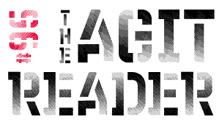
Can You Feel the Love Buzz?
by Kevin J. Elliott
Whether the upcoming debut album (Treats, out next month) from Brooklyn duo Sleigh Bells is either one of 2010’s biggest surprises or this year’s monumental bust remains to be seen. Basing a good six months of neverending hype on a disc of demos that could be counted on one hand might seem ludicrous to any legitimate critic searching for that new sound, but these days, among the internet wildfires, it’s de rigueur. There’s no denying that what guitarist/producer Derek Miller and vocalist Alexis Krauss do on tape and on stage isn’t as fresh as it comes, with Miller processing a number of devastatingly massive riffs (likely learned during his tenure in hardcore band Poison the Well) and distorted beats through a series of pedals and sequencers, while Krauss fluctuates between her girl-pop past (she was the centerpiece of tween hopefuls Ruby Blue) and primal scream therapy. Theirs is an operation that relies on efficacy and economy, and in that configuration, songs like the ultra blown-out “Crown On the Ground” or the lazy infectious groove of “Ring Ring” have a razor-sharp focus intent on communal rhythm and ear-splitting volume.
That Sleigh Bells were recently signed to MIA’s newly christened NEET label is fitting. Like that of the shape-shifting, globe-hopping trendsetter, the music created by Miller and Krauss is not of the pulse; it literally has controlled the pulse. Seeing the duo at both this year’s South By Southwest festival in Austin and as an opening appetizer on Diplo’s eclectic Major Lazer tour, there are few crowds, scenes and niches that wouldn’t have them aboard, as it seems their pop-electronic hardcore has become a phenomenon—regardless of the scant amount of material made public. Judging from the live show, and the abundance of new songs scattered among the “hits,” that lapse won’t last long. I recently got to speak with Miller as he was travelling from Rochester to Columbus along with the wild Lazers Never Die caravan. It’s doubtful they are getting much sleep on this tour.
I think the most striking thing about Sleigh Bells before even hearing the music is your background. How did you evolve or transition from what you were doing in Poison the Well to what you were doing by yourself for Sleigh Bells?
Derek Miller: I actually feel like they are more connected than people really notice. In Poison the Well, we were just trying to blend heavy stuff with melodic stuff, and I think Sleigh Bells is pretty much the same thing. The music is really heavy and rhythmic, but the vocals can be pretty melodic. That’s what always bothered me about hardcore—that it was super macho, and a lot of times, really violent. Those were the aspects I disliked. But I enjoyed the energy and the volume. So I feel like here I’m trying to get the best of both worlds. I love pop music, so we can do traditional pop arrangements and play blown out. I’m trying to marry the same things, but in a different context.
I suppose in many respects you could call Sleigh Bells hardcore in spirit.
DM: Exactly. It’s hardcore, but slowed down to 65 beats a minute for the whole song.
Even without an album out, it’s nice to see how you’ve already got a lot of different shades to your music. From “A/B Machines” to “Ring Ring,” the sounds have become less violent and caustic. Working on the new album, were you trying to show a balance of those extremes or did one side win out?
DM: I feel like the heavy side won out. There are less “Ring Ring”-like tracks. The music got heavier, but the vocals got more melodic. The new elements went farther in each direction. We were doing different things with the guitars and the harmonies—things I wouldn’t do in a hardcore band. All the rhythm is beat production, there’s no live drummer, and instead of shouting, there was a lot more actual singing.
What about bringing Alexis onboard? I know it was pretty much chance that you found her. Did you have an idea of how you wanted the vocals to sound or did she present you with something that you weren’t expecting?
DM: Absolutely. I did have a very specific idea of how I wanted it to sound, but what she brought was the natural character of her voice, whether she’s shouting or singing. There’s like a tone, a mood, and a character to her voice that’s unique to her. If she would have had a lower voice on something like “Ring Ring,” it would have failed miserably. But it worked out perfectly. The melodies suited her range perfectly.
I’ve seen the live show before and your set-up has become a point of contention. But then again, a lot of the bands I saw at South By Southwest were “duo with electronic.” Do you think the backing tracks are something you’ll always be doing or do you see yourselves inviting in other musicians to reproduce that live?
DM: I definitely want to stick with the backing tracks. Otherwise, it would be too much of a compromise, and the sound would change drastically. It would be unfair. I’m not interested in setting up that and having a guy in the back banging off time. Everything is so quantized. The groove has to be there. It has to be perfect. Everyone thinks we should have a drummer on “Crown on the Ground,” but then we’d hear a crash cymbal, and that’s not what it is. It’s white noise. It’s an electronic cymbal blown out. I don’t want a clean rock cymbal. Besides that it would be just another person to deal with, another mouth to feed.
How did you end up signing with MIA’s label? Did she have any hand in the creation of the album? Do you think there are similarities between what she does and what you are doing as Sleigh Bells?
DM: The recording was a locked session. She could’ve come in, but it was just Alexis and I and a really great engineer. I brought some horns in and a live drum to sample. It was a really simple operation. It was fairly insular.
It sounds like the full-length was a pretty ambitious undertaking for you. Is there going to be a big discrepancy between what people have heard before and what they are going to hear on this new album?
DM: It’s all really cohesive. It all makes perfect sense. With the demos, I thought we were going to re-record everything, but when we got around to “Infinity Guitars,” we loved it so much that we decided there was no reason to do it over. We thought we would screw it up. The big problem for me is that on all of the new songs, I’ve used so many new sounds that I’ve built up a library of thousand of kick drums now, where on the demos I only had two shitty drum machines. The limitations were good for the demos, but I needed more sounds for this one. Sonically it’s a much broader range. I had a much bigger palette. For sure the new stuff benefitted from it and pushed it—I hope—in new and exciting directions.
